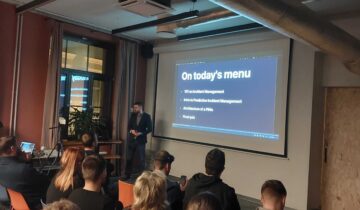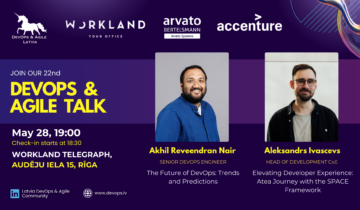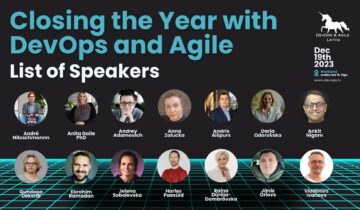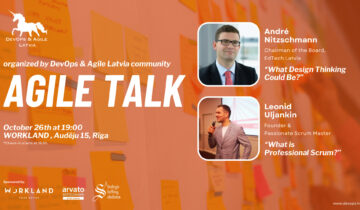Greetings to you dear reader!
I am Murathan, one of the DevOps Talks organizers. Today, I will be your narrator to tell you the story of how our 6th DevOps Talk on November 23 went with the first snowy day of this winter.
On a day we opened our eyes to an enthralling snowy view of beautiful Riga from our windows, finally, the time for our 6th DevOps Talk comes!
Our dear host, Liene, is starting our Talk with a cheerful introduction. She gives us a brief description of who we are. We are Techies of Baltics! We are working on building a DevOps community in Latvia, in Baltics, and even furthermore. If you are already not there yet, join us on our Slack channel!
Following the explanation of Liene about how the structure of our event will be, today’s presenter Ömer Karabacak is getting on the stage. He will be telling us how to build a command-line Minesweeper game with Python that is packaged as a Docker container. He has an article on this on his Medium page.
While he is giving us a short and sweet introduction of himself, he is also emphasizing the topic; should we(or can we) call a DevOps person a “DevOps Engineer” since DevOps is a philosophy. He is also mentioning that the meaning of DevOps is different and can vary depending on the company. How do you people think about this topic? Please feel free to share your thoughts with us!
How did it start? Ömer is saying that he was having one interview and was asked some questions about Python. During his interview, he was asked to create a dimensional matrix. The second request was then, adding the given amount of “X”s randomly in this matrix. For the third request, he needed to put numbers around the “X”s regarding mine counts around that cell. He realized then, these questions were the basic mechanics of a Minesweeper game. Therefore he decided to make some changes in his code and turn it into a real game. He wanted to package it with Docker because he is planning to add more features to this fun game which will bring some library dependencies and it would be nice to automate the packaging part.
Ömer is saying that, while he was evolving his code to Minesweeper game, another fact he realized is that he can also build a Battleship game based on these mechanics.
As he is showing us a demo of the game, a warm feeling appears inside. This game reminds me of my childhood days when I used to play it on a Win95 system at my father’s workplace.
The next headline Ömer wants to underscore is “How much Python do you need for DevOps?”. Well, it depends on the role and company, where you work. Because not everyone needs programming daily. For instance, some of his friends are mostly working with AWS, CloudFormation, and tools such as Terraform. But of course, still, you will need a programming language most of the time, other than shell scripting. So Python is a good suit in this case.
So he is explaining to us how we can measure the need for any programming language as a DevOps, especially for Python :
- Basic syntax knowledge
- Create simple tools for daily usages(Mostly single file small scripts for repetitive tasks)
- Libraries/Tools(Boto3, AWS CDK, Pulumi, etc.)
- You don’t need to be a hardcore programmer in Python to do daily basis DevOps stuff
So Python is a good suit in this case. Ömer is pointing out that he is not a fan of Python or any programming language because it depends on the use case. But wait, why Python? And here, at the moment, Ömer is telling us why :
- Easy to learn with simple syntax
- Easy to setup – Even it’s included in many OS
- You can do almost anything with it(Data Science, ML, Web Dev, Automation, Games)
- Large library and framework pool
- Huge community – Stackoverflow is our friend!
- Suitable for scripting because no need to compile
- Most demanding(especially in DevOps) and popular language in the market
You are still one of the wonderers why DevOps? Ömer is finishing his presentation with an epic saying, “DevOps because even Developers need heroes!”. Every company needs DevOps! I believe we all agree with Liene at the moment when she is telling Ömer that probably it was the most fun interview exercise he had. Who could have guessed an interview could lead him to build a CLI game.
And now, it’s time to move to our second part, The Discussion! Liene is giving the floor to our facilitator Uldis. As Ömer received only positive feedback on the chat that he deserved after his awesome presentation, he is asking us that if we are being too kind. But just as Uldis is saying, we are DevOps. We are always kind! 🙂
Uldis is briefly explaining how we will move on and proceed with the discussion part, and telling the rules for the ones who haven’t been in our talks yet – Yes, we have rules. As Uldis says, “Rules are meant to protect us!” :
- The camera on – Optional, but still better to see our discussant
- Care about the NDA!
- Everyone shares
- Do not interrupt, be respectful!
- Talk only about your own experience
- Be present, follow the talk
As our whiteboard is ready, Uldis is giving everyone one minute to think about what they would be willing to talk and hear from others about. It can be maybe an issue anyone has facing during work, or it can be any technical topic as well as non-technical.
As one minute is up, now our participants will give us a description of their topics.
Jelena is getting the mic first. Why people are not engaging a lot, not coming to meetups or hackathons? We are doing our DevOps Talks for some time, and Jelena is wondering why not more people are showing up, as there used to be more people participating. She would like to hear the thoughts of others about what is happening with people.
The second topic is coming from our host Liene: “Advent of code”. She heard that there are such events that you get daily tasks every day until Christmas. There are different of them, for different languages. She is interested in listening if anyone has experience with it. She’d like to know if they are super hard and worth giving it a try.
Another interesting topic is being brought up by Heta. “Thinking of different domains where DevOps can do the magic”. She’d like to hear about what different domains it can fit.
Pratick is new to the DevOps world. He is improving himself, learning languages. He would like to hear from experts what kind of skills are required to get a job in DevOps.
The next topic is coming from our presenter Ömer, “Issues in production”. He’s willing to talk and hear from others about how the production issues are managed. It’s not only for technical issues but also non-technical too. For instance, how people are managing the communication part in the company or the stakeholder part.
And the last, Albert is bringing up a question; “Did Covid change anything DevOps?”. He is curious to hear if someone noticed some interesting facts.
Uldis is setting the timer to one minute again, to let participants vote on a topic that they want them to be discussed. And there is the alarm sound, one minute is already up. There it is! We have a winner! It seems that people are really into talking/hearing more about “Advent of code”.
Advent of Code
Liene is reminding is shorty about the topic. She, today, overheard a developer colleague will try that for a language. Then she remembered she heard about it also some years ago from one of our participants Heta. She wants to give it a try actually, but she is not sure how hard it is to get a task every day and how much time it requires.
Ömer is going first. As he was googling it, he thinks that it seems something similar with 100 days of code or something similar.
Albert is next. First, he wants to point out the question “Why?”. For what reason do you want to do it, to learn a new language or get better at programming? For this case, you do not need a special event that happens once a year. He practised with codekata. He picks a kata and does it every day, even on the weekend days. Because he believes that it improves your skills as a developer. He is explaining that the term kata is coming from martial arts. You don’t need to do difficult exercises every day, what also matters is to keep up the consistency. Albert is sharing with us a website, that katas, such useful and interesting exercises can be found. He believes that it’s helpful for daily development tasks because usually, we don’t need to code complex algorithms every day. Even the tasks are simple, they can give us a different perspective of approaching.
Mustafa is sharing an honest confession. He googled it at first but then he realized he also used to use a tool several years ago to improve his developer skills. He believes it will force you. Mustafa used to focus on mostly SQL problems, relational database questions to solve. He certainly liked that and he recommends giving a try to that tasks.
Heta used to go through some coding competitions some years ago when she was in the university. She used to enjoy it because the purpose of that is you are doing it for a prize and a goal, and you get the adrenaline rush. One of the websites she used is hackerrank. There are also more special events organized once a year. It is fun, but it is also a challenge for pushing people to think out of the box.
Jelena is sharing another advent of code[adventofcode.com] that will start on December 1st.
Liene is happy to hear all these good suggestions. She is emphasizing a cool fact that this is exactly one of the reasons why we should have these talks/events: To get some ideas on the topics we have in common.
Terrific! We still have a bit of time left so we can go for the second topic. After a quick vote session, our next winner is Jelena!
Why people are not engaging a lot, not coming to meetups or hackathons?
Jelena is suggesting focusing on the topic of hackathons. People used to join those events and sit in there for even 48 hours by coding and solving puzzles. But nowadays it seems like people moved away. Jelena would like to hear from other participants if they are joining. Maybe do they hear from friends? Do people go, and if not, why they don’t?
Since we have quite limited time left, Uldis decides to speed things up. He is setting the timer to 4 minutes, and everyone has 4 minutes to write down what they have in their minds. Oh, here it is again, the sound that is capable of making many people nervous, the alarm sound.
It’s now Uldis’s turn to fascinate us with his voice by reading the thoughts/opinions written on our whiteboard.
The first one is short, “Time constraint and availability outside work projects”.
The next is more in detail, “Haven’t participated in any hackathon. I guess too scared that my skills won’t be useful. Maybe going with a friend would work. Maybe getting a good experience once is enough to get people going? Should include snacks and drinks.”
The third one is from a fair point of perspective especially after covid, “Due to work-from-home, the work-life has moulded into ‘just life’ because may are working more than 8h already”.
The last is “Too commercialized. Often there is bad preparation. Putting a lot of expectations on participants instead of warming them up. The jury often validates pretty presentations and ‘blah-blah pitches’ instead of actually working prototypes. Often the reason for events to happen is just companies looking for employees to exploit their hackers’ minds and involvement into something.”
We have our next event on the 21st of December. Whether you have topics in your mind you would like to share and discuss or you want to hear about interesting discussions from others, we have an open place for you. Come and join us!
We are looking for new speakers! Do you have a topic/case you would like to present and tell about? Feel free to contact us on our LinkedIn page or Slack channel to be our next presenter!




[…] know what to expect from DevOps talk? Check out review of the 6th DevOps Talk (or watch the presentation on YouTube), or look further, and see reviews for all of them here: […]
[…] Talk. Arturs is beginning by explaining the rules. Yes, we have rules! I will quote Uldis from our 6th DevOps Talk once more, “Rules are meant to protect […]